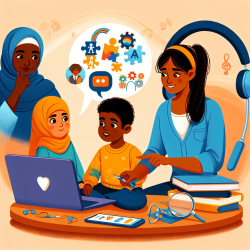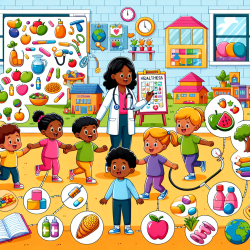Empowering Children's Futures: Harnessing Research Insights for Better Outcomes
As practitioners dedicated to enhancing the developmental outcomes of children, it is imperative to integrate data-driven insights into our practices. The Cohort Profile Update: 2015 Pelotas (Brazil) Birth Cohort Study offers a treasure trove of information that can be leveraged to improve the efficacy of online therapy services for children. This study not only tracks the developmental trajectories of children but also assesses the impact of the COVID-19 pandemic and evaluates parenting programs, providing a comprehensive view of factors influencing child development.
Key Insights from the Pelotas Birth Cohort Study
The 2015 Pelotas Birth Cohort Study, conducted in Pelotas, Brazil, is a longitudinal study that follows children from birth to ages 6-7. This study aims to understand the life-course determinants of health and development, focusing on various aspects such as violence, psychosocial development, stress, and the impact of the COVID-19 pandemic.
- Violence and Psychosocial Development: The study highlights the significant impact of violence on child development, emphasizing the need for interventions that address environmental and psychological processes.
- COVID-19 Impact: The pandemic's prolonged school closures in Brazil had adverse effects on children's development, particularly in poorer families. This underscores the importance of accessible online therapy services to mitigate these impacts.
- Parenting Programs: The PIÁ trial within the study evaluates the effectiveness of two group-based parenting programs, which have become public policy due to their positive outcomes on parenting and child development.
Implementing Research Findings in Practice
For practitioners, the findings from the Pelotas Birth Cohort Study offer actionable insights that can be integrated into online therapy services:
- Addressing Psychosocial Challenges: Incorporate strategies that address the psychosocial challenges identified in the study, such as violence and stress, into therapy sessions to support holistic child development.
- Leveraging Technology: Utilize online platforms to provide continuous support to children and families, especially in times of crisis like the COVID-19 pandemic, ensuring that therapy is accessible and effective.
- Promoting Effective Parenting: Encourage parents to participate in evidence-based parenting programs that have been shown to enhance child development, as demonstrated by the PIÁ trial.
Encouraging Further Research
While the Pelotas Birth Cohort Study provides invaluable insights, it also highlights areas for further research. Practitioners are encouraged to explore:
- The long-term effects of the COVID-19 pandemic on child development and how online therapy can continue to play a role in mitigating these effects.
- The scalability and adaptation of successful parenting programs to different cultural and socioeconomic contexts.
- The integration of new biomarkers and genetic data into therapy practices to tailor interventions more effectively.
In conclusion, the 2015 Pelotas Birth Cohort Study offers a robust framework for understanding the multifaceted influences on child development. By integrating these insights into online therapy practices, practitioners can enhance the outcomes for children, paving the way for healthier and more resilient futures.
To read the original research paper, please follow this link: Cohort Profile Update: 2015 Pelotas (Brazil) Birth Cohort Study?follow-ups from 2 to 6–7 years, with COVID-19 impact assessment.










